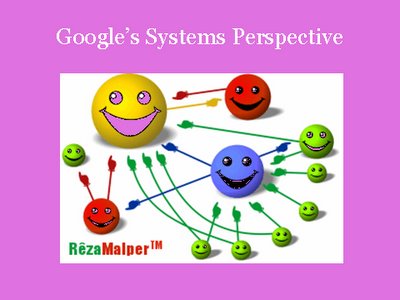Carsteadt spoke a lot about what he calls “The New Logic” in business and society in general. In this age of information and globalization as time seems to speed up, we are entering into what he describes as a more brutal period in human history – similar to when we entered the first Industrial Revolution.
In order for people and organizations to be successful, and more importantly for society to reach sustainability, we will need to embrace this new logic. The underlying shift in perception that is critical to this is one from a purely Newtonian world-view to one informed by quantum physics. It's important to remember that this shift is not an either/or decision, but a both/and situation - you don't leave behind the old, its more like adding to it.
One major associated shift is that from a world of things to a world of ideas. Carsteadt gave us an elegant, simple example of the implications of such a shift: in a world of things, people hold on tight to what they own, because when I give you a thing, you now have it, and I have nothing – so we tend to hold onto our things. But when I give you an idea, and you give me an idea, we both have two ideas, where we previously had one. So in the New Logic, sharing is mutually beneficial.
The internet is the prime example of this and the leader – Google – seems to understand this incredibly well. First, their business by nature has made the jump from the goods to the service economy – a key aspect of sustainable development (see post on Interface) (things --> ideas).
In dealing with the complex system that is the scale-free network (read Linked!) of the internet, it seems that Googlers have fostered a whole systems perspective (linear --> non-linear).
This has led to an adoption of the New Logic on the organizational level. Their hierarchical structure is loose, and they pride themselves on being a ‘flat’ organization – more of a network where people from engineering, finance, sales, etc all talk to one another and work together to co-create new ideas (hierarchies --> networks).
They are a learning organization – maybe in the truest sense of the phrase – they go beyond the scope of their own organization to introduce products in beta phase to the public and have several full-time people doing nothing but reading customer feedback (teaching --> learning).
You’ve probably heard some about the culture at the “Googleplex” – where you can bring your dog to work, play roller hockey, eat for free at the organic café, open doors, common space, etc – a lot of the typical geek, dot-com boom stuff. But clearly, they’ve done it right and created some amazing things for us by taking this approach (livelihood --> lifestyle; fear --> trust).
The most amazing thing about this is this perspective seems to have naturally pushed the company towards sustainability initiatives. They have some pretty proactive stuff going on in the company - $5,000 incentives for employees to buy fuel efficient cars, organic food, staff environmental days. They’re also pushing the server industry to improve efficiency technology for their 10,000 or so servers (clearly they have an economic incentive for this as well – best I could figure they probably spend around $2-3 million per year on energy to run and cool the servers they use to index the web).
The founders have invested in carbon pools – that will invest in CDM (Clean Development Mechanism) projects in
This is not to say there is no room for skepticism with this company – their size and influence is becoming mind-boggling. They say they value the integrity of their search results above all else, and I believe them, but there is certainly potential for abuse there. Privacy concerns are also valid – as they scan content that some might consider private domain. Easy access to public but personal information also has many people worried.
Still, I loved looking at this company because it was a pretty straight forward example of all of these things start to fit together – sustainable development, whole systems thinking, organizational learning, complex networks, meeting human needs (participation, understanding, idleness, creativity) – and it shows how businesses can benefit from embracing this kind of approach (the founders are both worth over $10 billion and the stock is above $460). I’m sure we’ll see others start to catch on! Stay going…


4 comments:
heavy blog!Googleis quite a company
Nice site!
[url=http://pviamlhk.com/zlbk/xuxm.html]My homepage[/url] | [url=http://fvjvaxcn.com/pncn/jxiu.html]Cool site[/url]
Well done!
My homepage | Please visit
Thank you!
http://pviamlhk.com/zlbk/xuxm.html | http://lecirdcf.com/ebok/bzza.html
Post a Comment